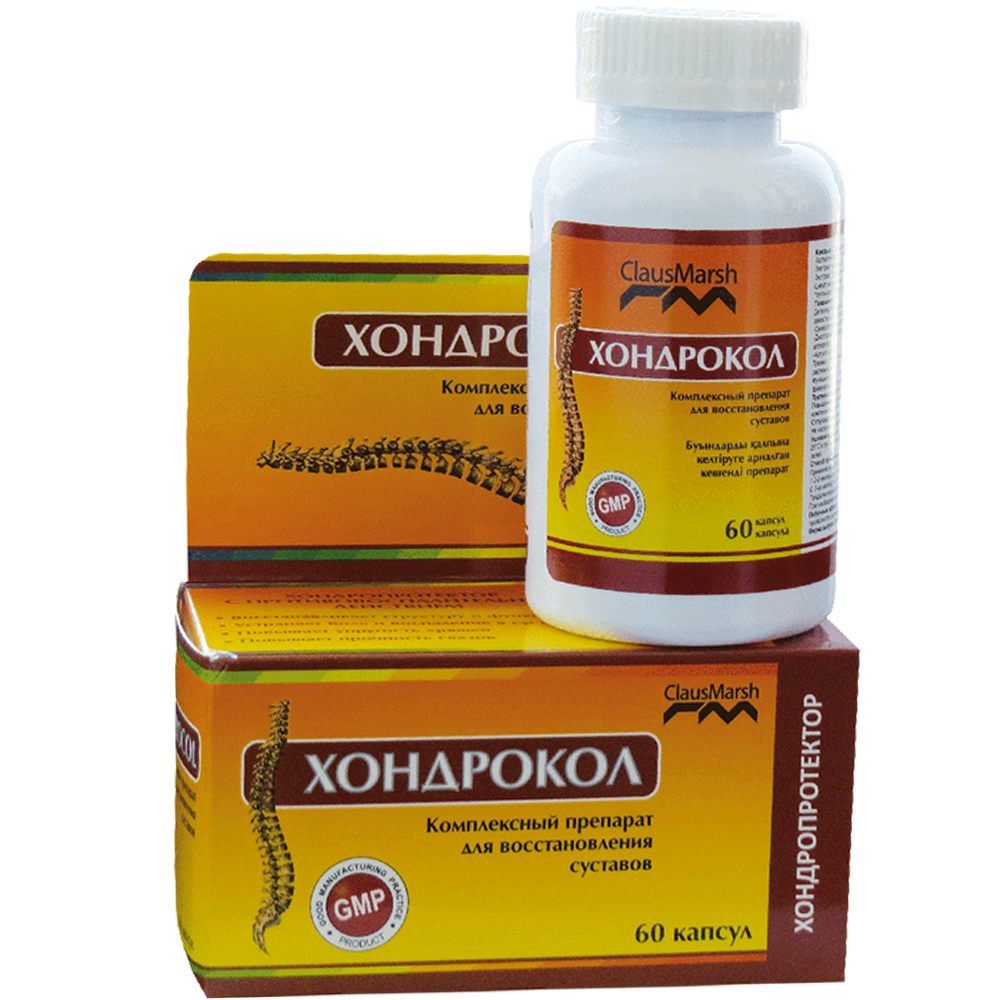
CHONDROCOL No. 60 (CAPSULES)
Field of Activity:
Application:
Release form:
Composition:
Compound: Every 3 capsules contain: Glucosamine sulfate 1500 mg; Collagen 800 mg; Methylsulfonylmethane 500 mg; Turmeric extract 400 mg; Chondroitin sulfate 200 mg; Boswellia serrata extract (frankincense tree) 200 mg; Cetyl myristoleate 100 mg. Pharmacological properties: Glucosamine is involved in the construction of cartilage tissue, the formation of tendons, joint fluid, connective tissue of the […]
Compound:
Every 3 capsules contain: Glucosamine sulfate 1500 mg; Collagen 800 mg; Methylsulfonylmethane 500 mg;
Turmeric extract 400 mg; Chondroitin sulfate 200 mg;
Boswellia serrata extract (frankincense tree) 200 mg;
Cetyl myristoleate 100 mg.
Pharmacological properties:
Glucosamine is involved in the construction of cartilage tissue, the formation of tendons,
joint fluid, connective tissue of the skin, bones, etc. Glucosamine has a low molecular weight and is almost
completely absorbed when taken orally. Thanks to this, it is easy to achieve an effective concentration of glucosamine in cartilage tissue.
Glucosamines are also precursors to hyaluronic acid, an important component of synovial fluid.
Chondroitin is a specific component of cartilage and is found exclusively in cartilage tissue. CHONDROCOL contains
low molecular weight fractions of chondroitin sulfate, which are almost completely absorbed into the gastrointestinal
tract and, retaining their structure, are embedded in cartilage tissue.
Ondroitin sulfate promotes the retention of water in the thickness of the cartilage in the form of water cavities
(microspaces - water cushions), which creates good shock absorption, absorbs shock, and ultimately increases the
strength of cartilage tissue and inhibits the action of specific enzymes, including lysosomal ones (elastase, cathepsin,
interleukin -1, etc.), released as a result of apoptosis of chondrocytes and destroying cartilage tissue. Chondroitin sulfate, like glucosamine,
has an anti-inflammatory and analgesic effect, reducing pain in the joints and spine at rest and when walking.
Stabilization of radiological parameters, such as the width of the joint space, indicates a stable restoration of the structure of the articular
cartilage, which is not possible to obtain with the use of non-steroidal anti-inflammatory drugs alone.
Collagen is a necessary protein for the synthesis of connective and fibrous cartilage tissue. If there is insufficient collagen, cartilage loses
its elasticity and strength, becomes rough and fibers.
Boswellia serrata (frankincense tree) has a pronounced anti-inflammatory effect, helps strengthen and restore the walls of blood vessels, thereby
facilitating blood access to areas of damage, and softens the signs of inflammation in arthritis.
The mechanism of action of boswellia, as well as non-steroidal anti-inflammatory drugs (NSAIDs), is based on blocking the synthesis of leukotrienes,
but unlike them, it does not cause side effects (ulceration of the mucous membranes, urticaria, bronchospasm, etc.).
Methylsulfonylmethane (MSM) is a natural compound of organic sulfur, which is part of sulfur-containing amino acids, complex and simple proteins, enzymes,
and other vital biological substrates of the body. MSM improves the permeability of cell membranes, which increases the bioavailability
of the main components of the drug into cartilage tissue
MSM promotes the regeneration and restoration of the normal structure of connective tissue, including the valve apparatus of the heart, basement membranes
of venous and arterial vessels, articular surfaces, tendons, fascia, ligaments of the knee, hip joints, spine and other most vulnerable tissues of the body.

